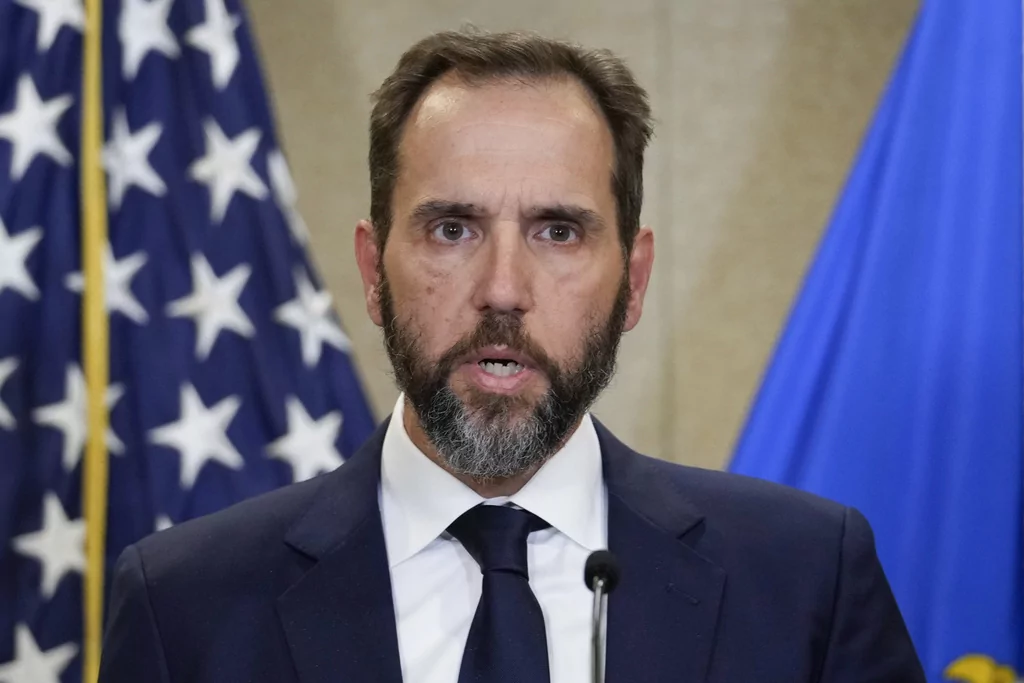
The Supreme Court’s decision on former President Donald Trump’s claims of presidential immunity has presented new hurdles for special counsel Jack Smith‘s criminal cases that should give him pause over his approach to the sweeping indictments, legal experts say.
Last week, the high court ruled 6-3 along ideological lines in Trump v. United States that presidents are immune from criminal prosecution for “official acts” but may still be prosecuted for unofficial acts. However, the ruling did not clearly define the boundary between the two, leaving the task now to lower courts to determine the extent to which Trump enjoys immunity under the new precedent.

“If Smith had thought just a little harder about immunity, he should have realized that he was going to have a real uphill slog here,” Josh Hammer, senior counsel for the Article III Project, said.
Chief Justice John Roberts, who authored the majority opinion, referenced a 2016 Supreme Court decision overturning the conviction of former Virginia Gov. Robert McDonnell, a case that was also prosecuted by Smith. The former Republican governor’s case stemmed from more than $175,000 in loans and gifts that he and his family received from a businessman who sought state universities to perform clinical tests on a dietary supplement his company created.
But Roberts found in the McDonnell case that prosecutors had defined “official acts” too broadly and took the position in the Trump decision that they had considered the question too narrowly. In both the McDonnell case and the Trump immunity case, Roberts leaned toward finding that prosecutors overreached and exceeded the authority and intent of the criminal statutes.
Richard Kelsey, a local Virginia attorney who extensively analyzed the McDonnell case at the time, said the irony is that Smith once held the position that anything an official does in office is considered an official act.
“With respect to Smith, the fascinating part is he’s been on both sides of the equation [and] hasn’t won on either side yet,” Kelsey said.
The immunity decision will likely limit the evidence prosecutors can present in Trump’s Washington, D.C., case and has already prompted new challenges to his felony conviction in New York and his classified documents indictment in Florida. It is also expected to lead to fresh motions to dismiss or limit the state charges Trump faces in Georgia for alleged election interference.
Notably, Smith has maintained his posture that the Sixth Amendment right to speedy trial should extend to the cases against Trump despite the growing belief among experts that the cases cannot be adjudicated before the Nov. 5 presidential election rematch between President Joe Biden and Trump. Hammer said this argument has and still is “beyond laughable” for Smith to make, given the “Bill of Rights is not to protect the government but to protect you from the government.”
At the very least, Trump could still learn before the election which acts he is or is not immune from if lower courts are able to comment through what some experts have dubbed “mini-trials” that will in essence apply the immunity standard to his indictment.
U.S. District Judge Tanya Chutkan is likely to resume adjudication of Smith’s Washington, D.C., case in August after the judgment returns to her court. However, sources told the Guardian this week that Trump’s lawyers try at no end to delay these hearings because of their potential to reopen the contentious aspects of the Capitol riot in the final months before the election.
Kelsey suggested if Smith seeks to bypass any further delays, given the potential for Trump to win reelection and dismiss the federal cases against him, then the special counsel ought “to go back into this indictment and figure out, ‘Is there a method by which I can get rid of everything that they can plausibly claim to be immune?’” The lawyer noted it wasn’t clear to him whether the special counsel would be willing to trim his indictment for the sake of getting a trial underway.
Hammer also said the one flaw of Smith’s case that remains prescient is the timing of which the case was brought, blasting the Justice Department’s relatively late decision to bring the charges against Trump in late summer of 2023. Attorney General Merrick Garland appointed Smith as special counsel in late 2022 to add independence to the Trump investigation, once it became clear Trump would run for president in the 2024 election.
“The most obvious thing that he could have done, is just get, get these things filed earlier, not worry about this race against the clock,” Hammer added.
Another matter that could worsen Smith’s hangups is the assertion by Trump that the special counsel’s appointment by Garland is unlawful, an argument that had failed with previous special counsels and was not at issue before the high court in the immunity decision despite gaining notable intrigue from Supreme Court Justice Clarence Thomas.
Smith is in the process of fighting this claim, arguing on Friday in a court filing in Trump’s classified documents case that Thomas’s opinion “neither binds this Court nor provides a sound basis to deviate from the uniform conclusion of all courts to have considered the issue that the Attorney General is statutorily authorized to appoint a Special Counsel.”
U.S. District Judge Aileen Cannon, who is handling the classified documents case against Trump, is currently weighing the special counsel argument. Kelsey said he believes that dispute could serve as a vehicle to present the question to the Supreme Court at some point regardless of how Cannon rules, but he said he thinks it would not be an “interlocutory appeal,” meaning it could only elevate to the justices after a potential conviction.
“I’ve been fascinated by that more than anything else because … what happens if you have a trial and you have all these convictions, and then that issue gets all the way up, and then all the convictions get thrown out because, guess what, Supreme Court rules he was never actually properly a special prosecutor?” Kelsey said.
Trump faces four counts in the election interference case: conspiracy to defraud the United States, conspiracy to obstruct an official proceeding, obstruction of and attempting to obstruct an official proceeding, and conspiracy against rights. He faces 40 in the classified documents case, including more than two dozen Espionage Act violations. Trump pleaded not guilty to all of the charges.
The complications presented by the Supreme Court, from the immunity review and Thomas’s mention of the legality of the special counsel appointment to a ruling about Jan. 6 that may also open an opportunity for Trump to raise additional challenges in the election case, are expected to cause severe delays to the already derailed original schedules of the cases.
Jim Trusty, an attorney who worked on both cases in 2023, said he views Smith’s prosecutions as overzealous and does not believe Smith has the “courage” to respond the way a typical prosecutor would, in a typical case, to the mounting challenges he is facing.
“In a normal world, Jack Smith would probably go back and re-present these cases in a much leaner fashion to the grand jury,” Trusty said.
Trusty speculated that Smith would, however, rather see his cases tossed out by judges so prosecutors could claim they were “unfairly treated or that the court is political rather than do what a normal prosecutor would do right now.”
He said in both cases, the indictments are “contaminated” by activity that is protected either by immunity or privilege. The Jan. 6 case is “really heavy” on immunized acts, while the Mar-a-Lago indictment includes some official acts as well as attorney-client privilege material that Trusty expects will be litigated in due time, he said.
“All of that reflects the fact that Jack Smith ran roughshod over historical protections like executive privilege and attorney-client privilege, and the immunity case begins to rein in that activity,” Trusty said.
CLICK HERE TO READ MORE FROM THE WASHINGTON EXAMINER
He added that he does not believe the courts are “blind to context.”
“They’re seeing overreaching, and they’re basically saying, ‘We’re not comfortable with a criminal justice system that’s acting the way Jack Smith is acting,’” Trusty said.






